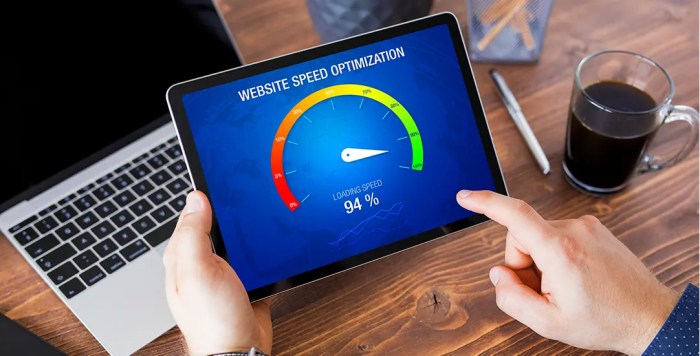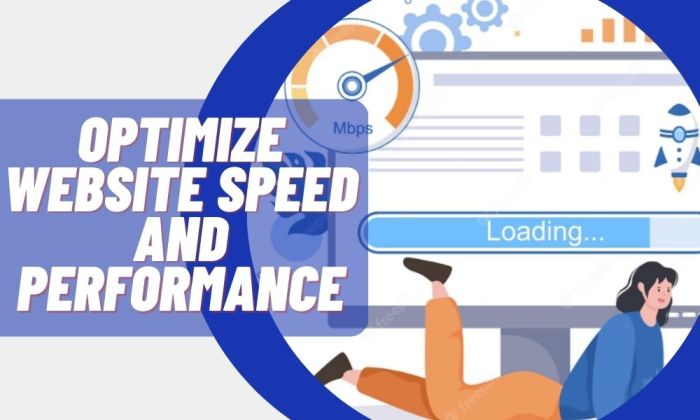Optimizing Website Speed dives into the importance of fast loading times, impacting user satisfaction and search engine rankings. From minimizing HTTP requests to utilizing browser caching, this topic explores key strategies to boost website speed for optimal performance.
Importance of Website Speed
Website speed is crucial for user experience because it directly impacts how quickly users can access and interact with your site. Slow-loading websites can frustrate visitors and lead them to abandon the site, resulting in lost opportunities for engagement, conversions, and revenue.
Impact on Rankings
- Google considers website speed as one of the ranking factors in its search algorithm. Faster websites are more likely to rank higher in search results, leading to increased visibility and traffic.
- Slow-loading websites may have higher bounce rates, which can signal to search engines that the site is not providing a good user experience. This can negatively impact rankings.
- Optimizing website speed can help improve crawlability and indexing by search engine bots, making it easier for your site to be discovered and ranked.
Industries Where Website Speed is Critical
- E-commerce: In the competitive e-commerce industry, fast website speed is essential to provide a seamless shopping experience and reduce cart abandonment.
- Media and Publishing: Websites in this industry need to load quickly to keep readers engaged and ensure that content is easily accessible.
- Travel and Hospitality: Users in this industry expect fast-loading websites to make quick bookings and get information efficiently.
Factors Influencing Website Speed

When it comes to website speed, several key factors come into play that can either slow down or optimize the loading times for your site. Let’s dive into some of the most crucial elements that influence website speed.
Hosting Services, Optimizing Website Speed
Hosting services play a significant role in determining the speed and performance of your website. The type of hosting plan you choose, whether it’s shared hosting, VPS, or dedicated hosting, can impact how fast your site loads. Shared hosting, for example, may result in slower loading times due to sharing server resources with other websites. On the other hand, dedicated hosting provides more resources for your site, leading to faster speeds. Opting for a reliable hosting provider with good server infrastructure and support can help optimize your website speed.
Image Size and Format
The size and format of images used on your website can also have a significant impact on loading times. Large, uncompressed images can slow down your site’s performance, especially on mobile devices with slower internet connections. It’s essential to optimize images by resizing them to the correct dimensions and compressing them without compromising quality. Additionally, using the right image format, such as JPEG or PNG, can help reduce file sizes and improve loading times. By optimizing images for the web, you can enhance your website speed and provide a better user experience for visitors.
Strategies for Optimizing Website Speed

When it comes to optimizing website speed, there are several strategies that can be implemented to ensure your site loads quickly and efficiently. From minimizing HTTP requests to optimizing CSS and JavaScript files, these techniques can make a significant impact on your website’s performance.
Minimizing HTTP Requests
One of the key strategies for optimizing website speed is to minimize the number of HTTP requests made when loading a webpage. This can be achieved by reducing the number of elements on a page, combining multiple files into one, and using CSS sprites to combine multiple images into a single file. By minimizing HTTP requests, you can significantly reduce the load time of your website.
Browser Caching
Browser caching is another effective technique for improving website speed. By leveraging browser caching, you can store frequently accessed resources such as images, CSS files, and JavaScript files on a user’s device. This allows the browser to load these resources from the cache instead of making a new request to the server every time a user visits your site. Browser caching can greatly enhance the speed and performance of your website.
Optimizing CSS and JavaScript Files
Optimizing CSS and JavaScript files is crucial for faster loading times. You can minimize the file size of CSS and JavaScript files by removing unnecessary spaces, comments, and formatting. Additionally, consider minifying these files to reduce their size even further. By optimizing CSS and JavaScript files, you can improve the loading speed of your website and provide a better user experience for your visitors.
Tools for Measuring and Monitoring Website Speed: Optimizing Website Speed
When it comes to ensuring your website is running at optimal speed, using tools for measuring and monitoring website speed is essential. These tools provide valuable insights into your website’s performance, helping you identify areas for improvement and enhance user experience.
PageSpeed Insights
PageSpeed Insights is a free tool provided by Google that analyzes the performance of your website on both mobile and desktop devices. It gives you a comprehensive report on various aspects of your site’s speed, such as load time, optimization suggestions, and more. By regularly running your website through PageSpeed Insights, you can stay informed about any speed-related issues and take necessary actions to address them.
- Utilize the suggestions: PageSpeed Insights offers specific recommendations to improve your website’s speed. Implement these suggestions to enhance performance and provide a better user experience.
- Focus on mobile optimization: With the increasing use of mobile devices, it’s crucial to prioritize mobile optimization. PageSpeed Insights helps you identify mobile-specific issues and optimize your site accordingly.
- Monitor changes over time: Regularly monitoring your website’s speed performance with PageSpeed Insights allows you to track improvements or setbacks. This data can guide your future optimization efforts.
By leveraging tools like PageSpeed Insights, you can proactively address speed issues and ensure your website delivers a seamless user experience.
